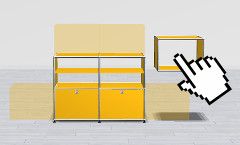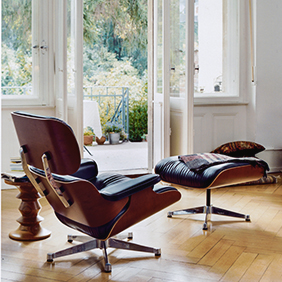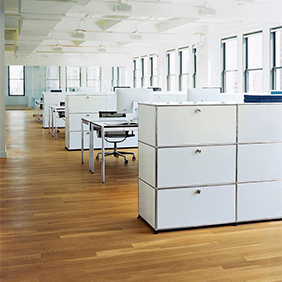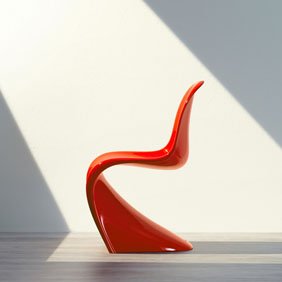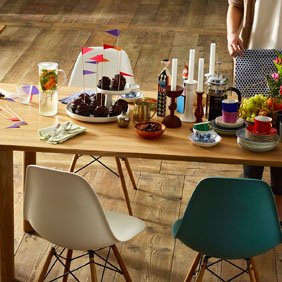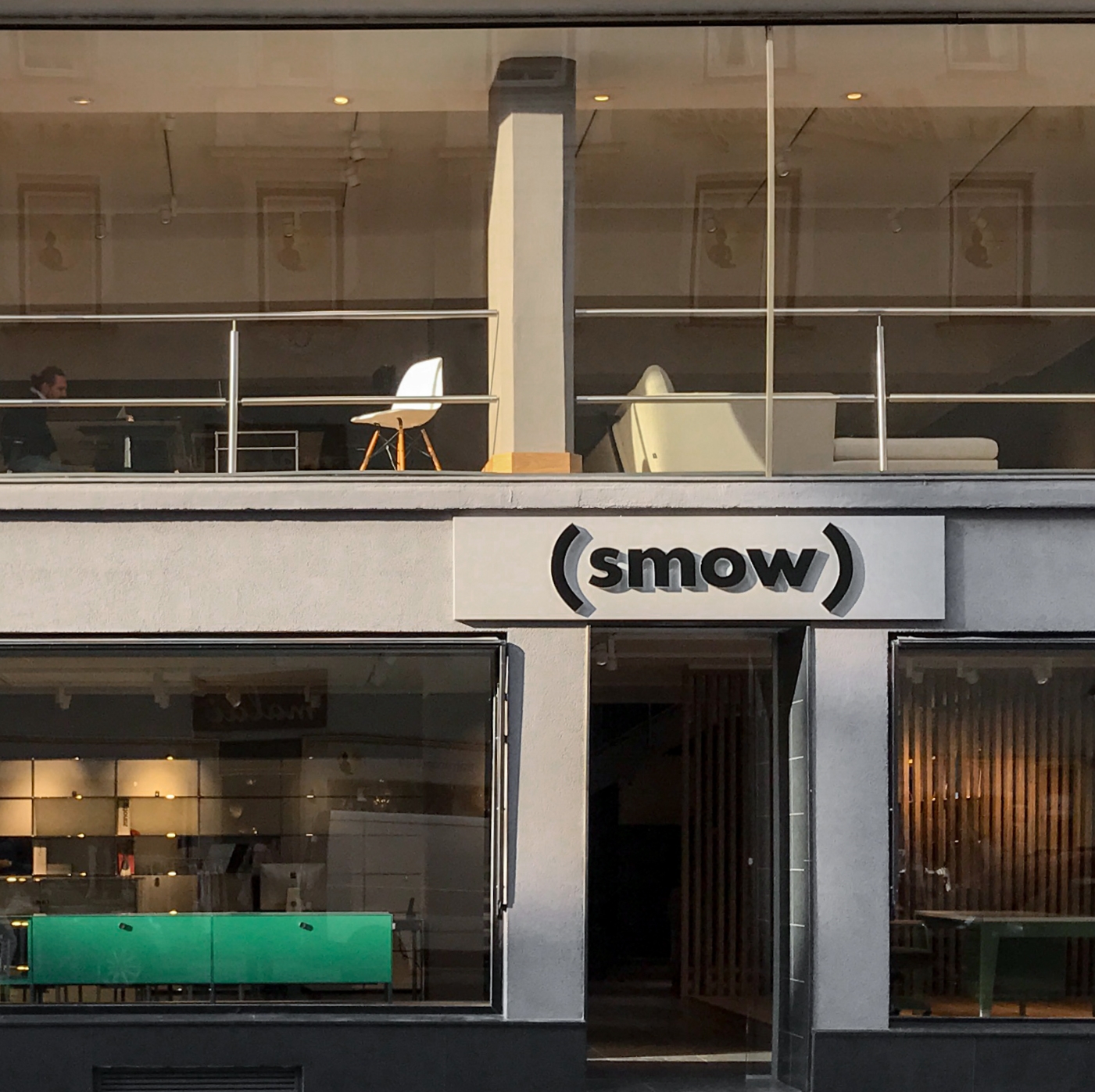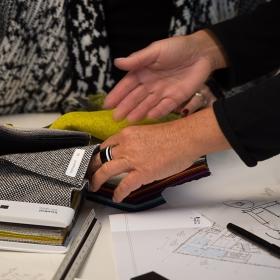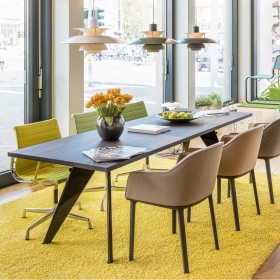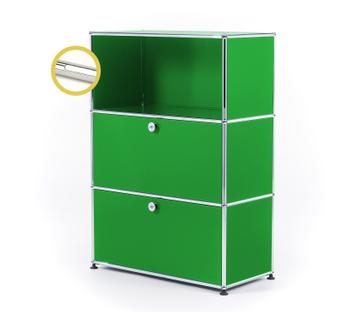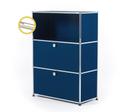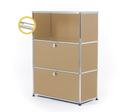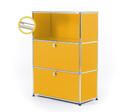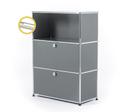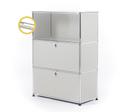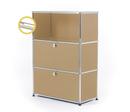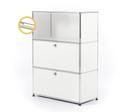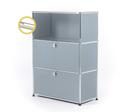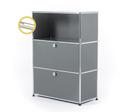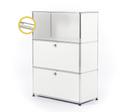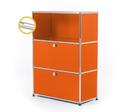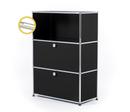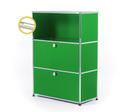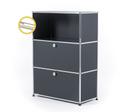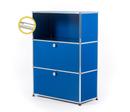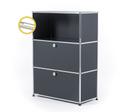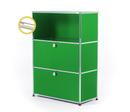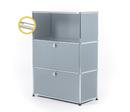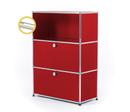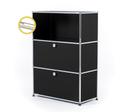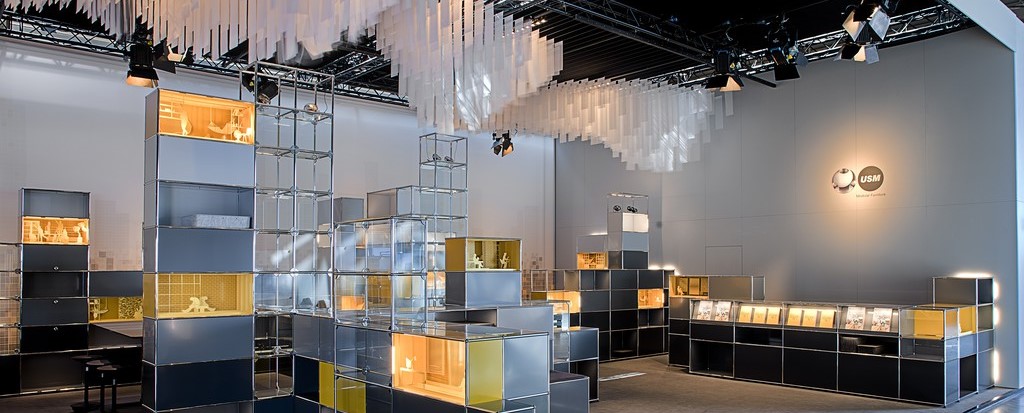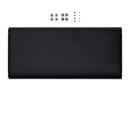USM Haller E Highboard M with Compartment Lighting, USM green, Cool white
Details
| Product type | Highboard |
| Dimensions | Overall: H 109 x B 78 x T 38 cm Ball centre to ball centre: H 105 + 4 x B 75 x T 35 cm |
| Weight | 42 kg |
| Material | Panels: Metal, powder coated Structure: Steel, chrome plated Ball: Brass, chrome plated |
| Colours |               |
| Colour chart | Request a USM Haller Colour Fan |
| Variants | LED compartment lighting either as warm white (2700 Kelvin) or cool white (5700 Kelvin)
  |
| Function & properties | Upper open compartment features 3 integrated USM Haller e-elements in the front tube (compartment illumination at 25 ° angle) Power supply via USM Haller e-supply including footswitch/dimmer bottom right (transforms the mains voltage to 24 volts, power 60 watts) Lower and middle compartment with drop down doors (without lock, without lighting) 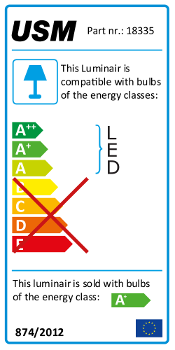 |
| Care | Chrome plated, powder coated and glass elements should be cleaned with a damp, light cloth and subsequently dried. Stubborn stains can be cleaned with glass cleaner or water mixed with ethanol in a ratio of 10:1 Please click on picture for detailed information (ca. 1,6 MB). 
|
| Awards & museum | MoMA, New York |
| Certificates | Inflammable class 1 (DIN 4102) GREENGUARD - Indoor Air Quality LEED "Green Directive" |
| Warranty | 24 months |
| Product family | USM Haller E |
| Datasheet | Further information on the Haller E can be found in the USM brochure, click to open (ca. 2,9 MB) 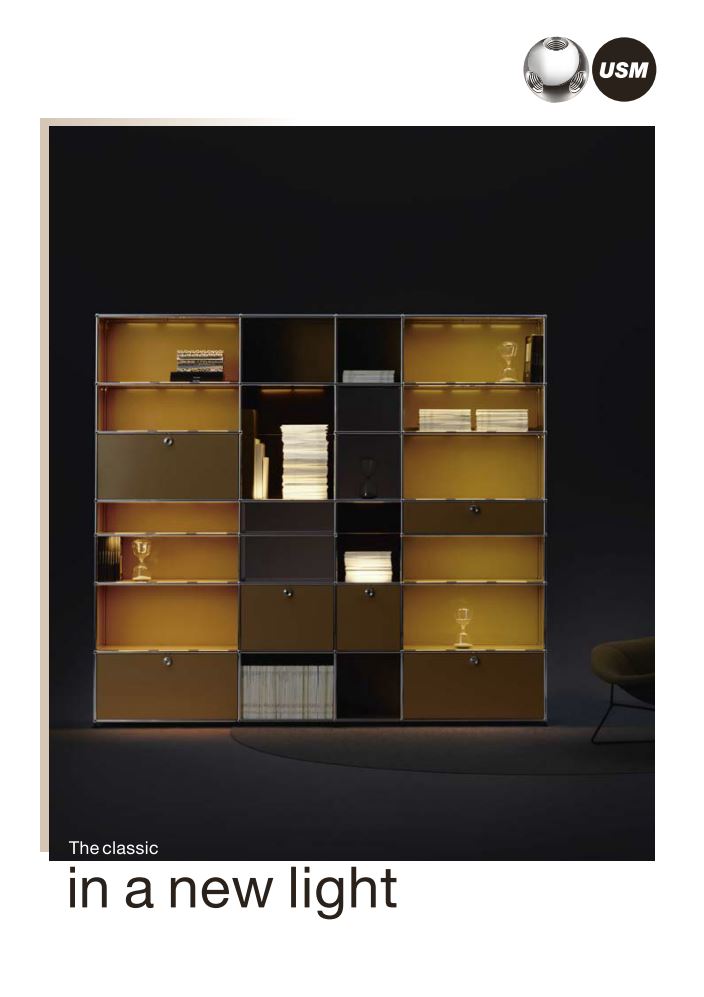 |
| Product presentation |
FAQ
Can I change the USM Haller E Highboard M light temperature at a later date?
Yes, the three lighting elements can be replaced as and when required.
How can I order a lockable handle for the doors of a USM Haller E Highboard M?
Once the highboard has been added to your basket, appropriate accessories will be displayed, including lockable handles.
What is the load-bearing capacity of a USM Haller E Highboard M drop-down door when open?
If as a temporary desk pad or storage area, the vertical load must not exceed 10 kg.
The Design
The USM Haller Highboard M is part of the USM modular furniture system designed by Fritz Haller in 1963 for the USM office pavilion in Münsingen, which he also designed. At the beginning of the sixties, the then company director Paul Schärer, commissioned the Swiss architect with planning of new company buildings; and after their completion wanted that the rooms should be flexibly furnished and therefore in keeping with to the concept of the open-plan office, which was still in its infancy at that time. In 1963, Haller developed the USM Haller sideboard as part of a metal shelving system especially for the needs of USM. And only USM. However in 1969 the system entered mass production and since then USM Haller shelving have been characterised by their simple, modular principle, which allows for the construction of a wide variety of interior design solutions. Since 2017, USM Haller also offers lighting elements for USM Haller furniture. The newly developed e-tubes and e-connectors provide power to the special lighting elements for an elegant compartment or background illumination.

Designer of the USM Haller System: Fritz Haller
Designer
Fritz Haller, designer of the USM furniture, initially trained as a a draughtsman. Familiar with the architectural profession of his father from an early age, an important influence on his own understanding of the profession came during his time in the mid 1940s in the Rotterdam office of Willem van Tijen and Berend Bakema; at that time two of the most important representatives of post-war Functionalism. Under this influence, and having returned to Switzerland, one recognises in Haller's early buildings a functionalist orientation and a striving for systematization. Something perfectly expressed in his USM modular furniture system. After Paul Schärer Haller had commissioned Haller in 1960 with the planning of new USM factory and administration buildings he designed the USM Haller furniture system: a system which would revolutionise the world of office furniture. In 1977 Haller succeeded Egon Eiermann as professor at the University of Karlsruhe and also taught in Stuttgart and Dortmund. His greatest success remains USM Haller. The system has received numerous awards in the US and Europe and has become one of the genuine classics of modern design history. Fritz Haller died in October 2012 in his native Switzerland.
Manufacturer
USM can look back on a long history. Established in 1885 by Paul Schärer as a hardware store and locksmith business, the company developed into a metal factory and then under the direction of Paul Schärer into a modern industrial enterprise. The development of the USM Haller furniture system of 1963 was however to have a decisive influence on the history of the company, which in 1969 began the serial production of the modular furniture system. Today, USM sells the furniture system, which has been copyrighted since 1988 and is part of MoMA New York's collection, in showrooms from Japan to New York. In 1992, the previous core business producing window fittings was discontinued, allwoing the company to concentrate exclusively on the production and further development of the USM furniture system, which is today features USM sideboards, USM rollcontainers and USM tables.
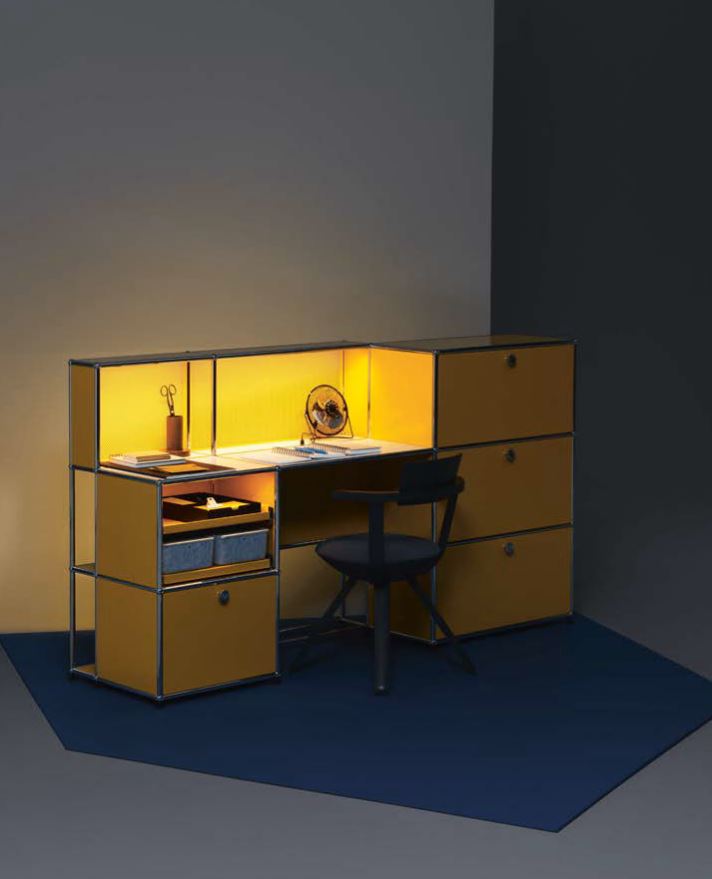
Since 2017, USM Haller furniture can be equipped with lighting
Production
USM produces all parts of the USM Haller furniture at their Swiss headquarters in Münsingen. All metal cladding elements are powder-coated in the typical colours, such as USM Haller white, graphite black or ruby red. From principle the firm promote responsible use of energy, raw materials and reduction of emissions in all stages of production and sales. Ecological sustainability is in addition also part of the design of the USM Haller product: all materials are of high quality and extremely durable, and the furniture can also be adapted as your requirements for your USM Haller unit change, it does not have to be replaced by a new piece of furniture, but can be adapted to meet the new circumstances.
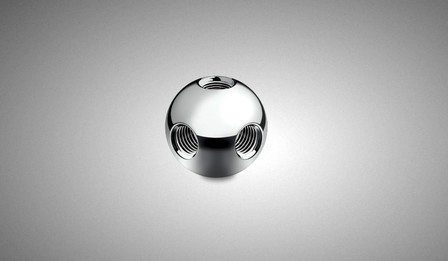
The hallmark of USM furniture systems: the chrome plated brass ball which holds the individual elements together.
Historical Context
Not only Fritz Hallers's architecture, but also Haller's USM furniture system - a project that is very closely related to his architectural work - is today clearly defined as functionalism. Although the term had already played a role as a key principle of the Bauhaus movement it was after the Second World War that functionalism evolved as the epitome of modern construction. In essence with functionalism all frills and embellishments are studiously avoided, and instead the aim is to achieve a universal and time enduring aesthetics by focusing on functional aspects. Not only in the world of office furniture does Haller's shelving system elegantly meet this requirement, but also, for example, in the living area with USM media furniture. On the one hand USM is with its flexibility, adaptability and functionality almost unbeatable, on the other hand, thanks to its rigorous reduction to basic geometric structures a timeless formal classic.

